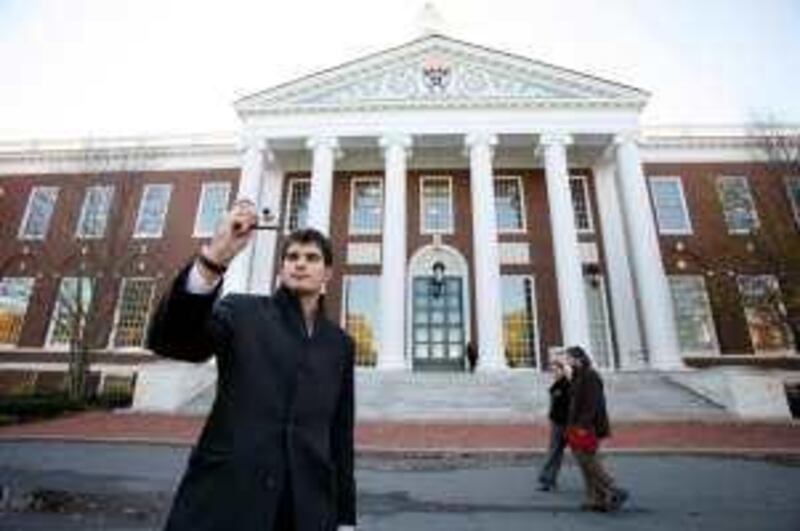Recently minted Masters of Business Administration have been swearing to be virtuous professionals. For everyone's sake, let us hope they are being honest, Rehan Khan writes If you are a 30-something business executive who has fallen on hard times as the grim reaper runs his scythe through your company, chances are you may now be enrolled in an MBA programme, or at least thinking about joining one.
You will have the expectation that studying for an MBA will make you a better leader and manager who is more employable and who can in turn command better pay. If that is not your motivation, you must be on a journey of self-discovery, or something fluffy and vague like that. You want to make society a better place and spread goodwill through the corridors of business. The world needs more of you.
Certainly that is the conclusion of the Harvard Business School Class of 2009, the ones who initiated the MBA Oath (www.mbaoath.org), a solemn promise to lead professional careers marked with integrity and ethics. "As a manager, my purpose is to serve the greater good by bringing people and resources together to create value that no single individual can build alone. Therefore I will seek a course that enhances the value my enterprise can create for society over the long term," the oath begins.
In this year of soul searching, the idea has been a big hit across business school campuses, and the founders hope that it will influence the thousands of decisions that managers make. But that is in the future. In the present, as I learnt from a senior executive of a Swiss bank this week, the outlook for business school graduates is pretty grim. The executive told me that the bank had taken on a couple of MBA graduates for a pittance. They weren't paying them anything except expenses. Pretty depressing if you have spent the past two years pummelling your brain with four-by-four matrices and creating colourful calculations of net present value.
So is it really worth doing an MBA in today's economy? As I learnt from my own MBA experience after the bursting of the dotcom bubble, an intensive programme of study for skills that help me earn a living can never be a bad thing. Coupled with the opportunity to network with peers across industry and disparate geographies, it has a lot of benefits. Whether you have aspirations for the top job or not, studies have shown that those who have an MBA are likely to fare better than those who do not. One such study, by the INSEAD professors Herminia Ibarra and Morten Hansen this year reported: "In a large-scale study of CEO performance since they took office, we found that, other things equal, MBA CEOs had a slight performance edge over their non-MBA peers. In our analysis and ranking of the performance of 2,000 CEOs around the globe, CEOs who had an MBA on average ranked 40 places higher than CEOs who did not have an MBA - a statistically significant effect."
Christopher Oldfield, a successful businessman based in Dubai who received his MBA from Cass Business School, believes his qualification made him a better leader. "Nobody can lead a business unless they understand how businesses work and how they are led," he says. "MBA courses provide knowledge and training for future general managers and leaders. However, an MBA is the beginning of a journey, not the end. Employers must develop expertise and processes to handle the re-entry and development of MBA graduates."
The re-entry of graduates and how well this is handled can determine whether the MBA executive stays and continues to add value or decides to take his or her new-found skills elsewhere. "The focus really has to be on integrating the returning MBA back into the business," says Seema Hallon, the regional head of human resources for Dun and Bradstreet. Ms Hallon suggests that an organisation be specific about what value the MBA can bring to it. "A clear growth path based on defined milestones will take care of their aspirations as well as work as a motivator for others to seek further education," she says.
But with executive education booming in a depressed economy, it is important for MBA candidates to differentiate themselves. After all, in the US alone, business schools awarded 100,000 MBAs last year. Mr Oldfield suggests that during the course, each student should be working on a thesis associated with a brand name and a clear career path. After graduating, he or she should maintain relationships with the business school's alumni, plan a first-day, first-week and long-term re-entry into the organisation and at all costs avoid projecting a know-it-all attitude, which could cause resentment. This is particularly applicable to the relationship with one's boss.
John Baldoni, the author of Lead Your Boss: The Subtle Art of Managing Up, advises: "Check your ego. You may think you are smarter than your boss and you just might be, but don't show it. Your MBA indicates you have book smarts; now it's time to show that you have job smarts. That comes with putting your time in, listening and asking questions. Resist the temptation to play one-upmanship. You might be right, but instead of showing people up, show them how. Humbly."
A degree of humility and an MBA Oath are the order of the day for business school graduates. Is this approach just another management fad or a sign of the times? I guess we'll find out from the Class of 2020. By that time, the Class of 2009 would either have made the business world a better place or - let us not mention the alternative. Rehan Khan is a business consultant and writer based in Dubai





